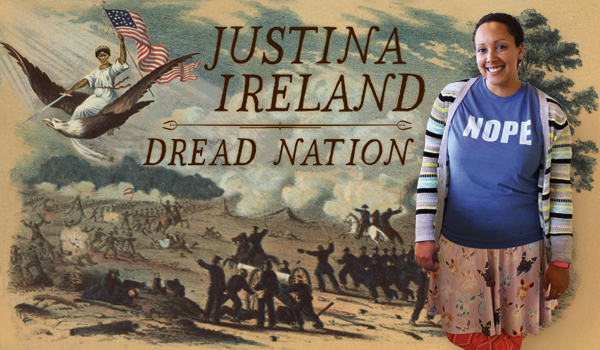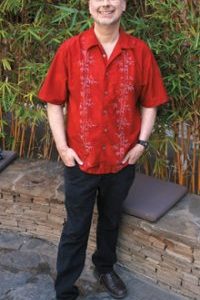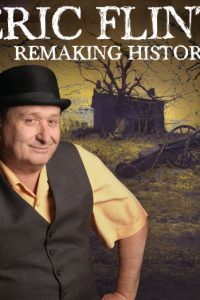Justina Ireland: Dread Nation

Justina Ireland was born in French Camp CA, and grew up in San Bernadino and outside Sacramento. After graduating high school, she joined the Army, got married, and later settled in Pennsylvania with her husband. In addition to writing, she works as a supervisor in logistics for the Department of the Navy.
First novel Vengeance Bound, a YA fantasy about a girl with a psychic link to the Furies, appeared in 2013, followed by YA fantasy Promise of Shadows (2014). Her YA paranormal thriller Girl Reaper is being serialized online by fiction app INKLO. Middle-grade series Devil’s Pass has four books out in 2017: Evie Allen vs. the Quiz Bowl Zombies, Jeff Allen vs. the Time Suck Vampire, Tiffany Donovan vs. the Cookie Elves of Destruction, and Zach Lopez vs. the Unicorns of Doom. Her YA Civil War-era zombie novel Dread Nation is forthcoming, along with adult SF novel The Never and the Now.
With Troy L. Wiggins, Ireland co-edits FIYAH, a quarterly magazine of black speculative fiction launched earlier this year.
‘‘If you never see yourself represented in media, do you exist? It feels very simplified when you put it that way, but for a long time as a child, I felt that way myself. I’m biracial. My mom is white, but there were a lot of years when I thought, ‘If I were born white, my life would be so much better.’ I could be a princess and I could go on magical adventures and do all these things that only white kids do. Occasionally a plucky redhead. But none of that is open to me because I’m a black girl who lives in a trailer park, right? As I got older, and especially as my daughter began reading books, I looked around at the media we have, and thought, ‘This is pretty fucking awful. This is like an apartheid of black people.’
‘‘This is right about the time I was starting to write, and N.K. Jemisin’s Hundred Thousand Kingdoms came out, and I lost my shit. I had heard nothing about it. I wasn’t really involved in adult SF/F online space, and I was only peripherally involved in YA. I had gone to the library and found this book, with this gorgeous cover that was very magical and sparkly. It was big, and I love big books, so I got it from the library. I couldn’t believe the main character was black. She’s clearly described as biracial. She talks about her hair, she talks about trying to fit in with her father’s white relatives who are very powerful. I was a third of the way through and I was like, ‘What? Did I miss something?’, and I went back and read it again. It was so exciting to see someone who first of all was biracial so they understood the competing of two worlds and navigating that, but second of all was just there to have a really hot sexy adventure. That book is sexy as hell and you can’t tell me it’s not – because everyone loves a pantheon. I was like, ‘oh my God this can be done?’ It was awesome.”
*
‘‘If you talk to authors of color, especially of young adult, not sci-fi, they’ll say, ‘Yeah, I did that too.’ Their first book on contract is all white main characters. I call that the Beyoncé method. Come in with Destiny’s Child, and then drop ‘Formation’ on their ass. There’s also this theory in young adult that you get one chance and if you don’t make it, then you’re out. I guess my career is over. I’m just going to talk about the shit nobody wants to talk about. Then I sold more books, so, I might as well keep talking about it. Publishing is the worst confluence of art and industry. We really want to make money, but here’s art, and here are industry forces. What does that do to people? A lot of people are struggling in the industry. They feel isolated and alone. You don’t get in with a group of friends and write together – you could, but writing is solitary, and people don’t like to talk about their failures. I think publishing makes us feel bad about our failures. If you go out on submission and your book doesn’t sell, you think, ‘But I was told once I had an agent my book was going to sell.’ It happens to everybody, though. We talk about the business side of struggle, sometimes, but not a lot, and we never talk about how we feel alienated, or like our stories aren’t embraced by the industry.”
*
‘‘I started writing after I had my daughter. Anytime you have that upheaval in your life, you step back and think, ‘What did I do?’ I knew I didn’t want to be just a mom. I’d seen enough other women go, ‘All right, my life is done, I’m a mom.’ I don’t want to do that. All these things I haven’t done, that I want to do, I have to do them, and writing was one of them. The first novel I wrote was a terrible book. It will never see the light of day. Then I finished the second book, and that was better. I got an agent, it went on submission, and it didn’t sell, but I still think it’s really good. I will be serializing it on a new platform called INKLO. It’s called Girl Reaper. It’s about a girl who’s a reaper. I’m terrible at titles. Every time I have a book, the editor says, ‘Okay, about the title.’ I’m like, ‘You do what you need to.’ I hate titles so much. I wrote all the other words, but not those.
‘‘Dread Nation is about a zombie apocalypse during the Civil War, but it’s not really about the zombies, because a lot of the time, zombie novels lose the importance of zombies: they’re about an upheaval in society that makes you reevaluate your humanity. It’s about exploring people with their humanity stripped away. My novel follows a black girl on her journeys, trying to come to terms with this society where she knows the undead are not human. That is not humanity. But then, why is she also not human? How is she considered closer to livestock than to humans? It’s really about the idea of humanity, and who gets to be human and who gets shunted to the side as the other.”
*
‘‘I grew up in California, where nobody’s itching to go out and shoot people. In Pennsylvania, it seems like a very honorable thing to do, to join the army, get out of your small town and serve your country. In California, that’s not something we do. Also, as a woman, why would you want that? It’s all sweaty dudes. They were right. My career was all sweaty dudes. But there’s something about being able to handle sweaty dudes – even in my day job, I am one of eight supervisors, one of only two women, and the only black woman there. I spend a lot of my time fighting with men. It’s not fighting just to fight, it’s fighting because I’m like, ‘You’re not going to treat me that way – you’re not going to talk to me that way.’ I have things to contribute, and you’re going to listen, especially since my job involves policy, a lot of times I’m telling people things they don’t want to hear.”
*
‘‘I think that’s what Fiyah is trying to do. We’re doing for oneself, but we want to get authors to participate. We also have a robust online community. We’re going to do Camp Nano, we did Nanowrimo for November, to get people together talking about writing, and to connect as a community. We also want them to go break down doors. I don’t want black authors just to submit to Fiyah. I want you to submit to all the venues. Our payment is token, we’re only paying $150 for a short story and $300 for a novella. I want you to go submit to Tor.com and Apex and Clarkesworld, and all those other venues considered to be the premier science fiction and fantasy publications. Until you’re comfortable getting there, send us your stuff. All of our rejections are personalized, and we talk about what works and what doesn’t. I’m really excited about it.’’
*









Good Afternoon,
Thank you for your telling an alternative history of the West. A history where Black People are not glaringly ignored/omitted.
Here at my company, 8 years ago, I started a Sci-Fi book. All of the 8 active members are white with the exception of two of us.
During this time, the most appreciated book/series of our 8 years, The Broken Earth Trilogy/N K Jemisin. Our most critical reviewer’s only complaint in all of the 3 book series was the use of the word “magic”, last pages in the last book (LMAO).
This month of Mar’21, again, chosen by the majority of our members, Dread Nation. It is not what we might say is “Sci-Fi”, and yet the club considered it well worth reading. And lo and behold, it is a great read! I’ve since read, and just finished Book 2. I will follow-up by reading your suggested titles on the history of Blacks during that period of western expansion. I dare say, at least one of our members is planning to read the second book as well. Generally, women in fiction/Sci-Fi have had a hard time getting noticed, especially so for Black Women. I dare say, I’m glad your time has finally arrived.
In your universe, I hope that in the end that the Chinese would return to China and the Europeans to Europe, leaving the original inhabitants, Indians and Blacks alone. And too, that maybe technological advantage might not lead to devastation for everyone else along with the planet, as it is today.
This is my first ever fan email, which I believe means I have to keep up with all past and future books, etc. (lol).
Thank you again,
Robert